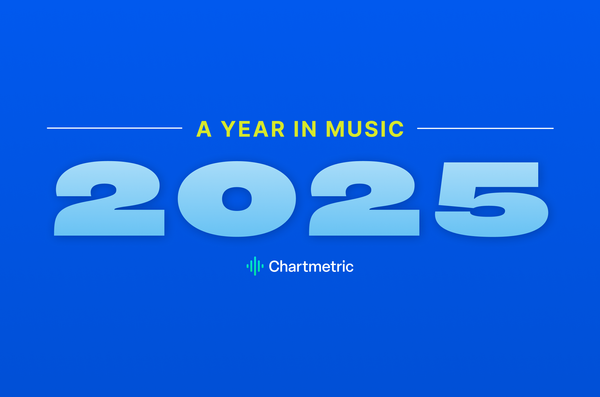When JENNIE—one fourth of the world’s most famous K-pop girl group BLACKPINK—released her first solo single in November 2018 she knew that she’d attract attention. The swaggering confidence of the song, aptly titled “SOLO,” is present in the electro-pop track’s trippy anti-drop of a chorus: “bichi naneun solo.” The meaning in English: “I’m a shining solo.”
The first member of BLACKPINK to drop a song outside of the group’s already mega-popular catalog, JENNIE’s solo debut captured the ears of more than just her loyal fanbase. Four days after its release, “SOLO” had racked up 4.5M streams on Spotify, and debuted at the top of the South Korean Circle Digital Chart—Korea’s version of the Billboard Hot 100—staying on the chart for 33 weeks. A holistic view of the track’s impact shows a slightly different story: On the day of its release, “SOLO” held a Chartmetric Track Score of 677. The current highest-scoring track on Chartmetric, “APT.” by fellow BLACKPINK member ROSÉ, is currently 9.11K, so “SOLO”’s debut score is quite low in comparison. A week later the score dipped even lower by 42%.
The past few years have seen a number of K-pop artists moving into a new facet of their solo careers, one that seems primed for an international audience first, rather than a domestic one. Last year, all four BLACKPINK members chose not to renew their solo contracts with long-time label YG Entertainment, choosing instead to either form their own agencies or sign to other ones (the girls will continue to promote under YG as a group). LISA, JENNIE, and ROSÉ have already released new material through these new ventures, and the successes they’ve achieved thus far are notably different from their previous solo efforts for a number of reasons. The obvious is their increased autonomy: away from the rigor of the mainstream K-pop industry—where labels tend to be in control of a group’s music, styling, concept, and more—the members have more of a choice in the people they work with, the concepts they stage, and the music they write. The other? All these new releases have been fully in English.
Yet, a question ultimately comes up when discussing the English-language successes of stars who sing and speak primarily in Korean. As global music streams continue to rise, why does it seem like the American music industry is rewarding foreign artists for English-language music?
This October, JENNIE made a different sort of debut: one under her own company, ODDATELIER, and under a new American major label, Columbia Records. The buzzy, anthemic single “Mantra” was her first solo release after declining another solo contract with YG Entertainment. The lyrics express a pointedly luxurious, it-girl attitude, sharper than BLACKPINK’s in-your-face type of confidence: “This that pretty-girl mantra, this that fault ya, just touched down in L.A.”
@loveanimekpop Mirrored #jennie #mantra #jenniekim #blackpink #new #fy #mirrored #mirror #fyp #foryou #fypシ゚ #tutorial #kpop #kpopfyp #dance #bp #blink #jenniemantra #yg #jennieblackpink #newsong
♬ Mantra - JENNIE
“Mantra” was even more impactful than “SOLO.” The track saw its Chartmetric Track Score increase by almost 500% in the week after its release, and by its fourth day, it had broken 15M streams on Spotify. In Korea, however, her commercial success appears to be not as big as it was in 2018. “Mantra” debuted at No. 52 on the Circle Digital Chart, and peaked at No. 3 two weeks later. While it currently sits in the top 10 of the chart, its position has appeared to lower each week.
A similar public response has been playing out for BLACKPINK’s LISA, the first of the four members to go solo via her own company, LLOUD. As a Thai singer working in Korea, LISA had already built up a robust global audience, particularly in east Asia. Her original debut under YG, with the Korean-language “LALISA” in 2021, broke some significant records with the help of that audience: the music video achieved 73.6M views on YouTube in just 24 hours, breaking a Guinness World Record that was previously held by Ariana Grande. Yet the highest-viewed video of LISA’s on YouTube isn’t her 2021 lead single, but the English-language follow-up, “MONEY.” The swinging hip-hop track experienced a 377% increase in YouTube videos one week after its release; it’s also the only of LISA’s videos to have passed the 1B view mark.
But it’s this year’s hard-hitting hyperpop song “Rockstar” that’s proven to be LISA’s biggest hit across the world, and especially in the West. The track’s Chartmetric Track Score rose from 80 to 5,217 in one week of release, an over 6000% increase. Accompanied a number of high-profile television appearances on the American Music Awards and the Victoria’s Secret Fashion show, LISA’s Spotify monthly listeners increased by 210% four months after its release. Yet with a lack of appearances in South Korea, the track has had less of a reception there: “Rockstar” didn’t enter the Circle Digital Chart, and while the U.S. has played the song over 5,000 times on the radio, it hasn’t been played at all in Korea.
While JENNIE and LISA have reached significant milestones in their respective solo debuts, ROSÉ is the BLACKPINK member with the biggest commercial success. In October, the lead singer with a powerful, piercing voice, released the first single off her upcoming solo album: “APT.” The track is jangly pop-rock fun, has a livening feature from Bruno Mars, and overall marked a huge sonic shift from ROSÉ’s debut EP on YG, R. “APT.” was an immediate sensation across the globe: its Spotify Streams grew to almost 100M in just first week of its release, and it also saw a 400% increase in YouTube views during the same time period. “APT.” also debuted at No. 8 on the Billboard Hot 100—making it the highest charting song by any BLACKPINK member—and is currently the No. 1 track globally by Chartmetric track score.
ROSÉ’s runaway hit is primarily in English, but the song’s catchy hook borrows from a popular Korean drinking game. The song’s title is not pronounced as “apartment” but the Korean phrasing of “apateu.” Perhaps this is why the song, though earwormy as it is, is making a similar splash in Korea, where it’s remained at No.1 on the Circle Digital Chart for five consecutive weeks as of this writing.
Over a year ago, another group of K-pop idols were breaking away from their band, the biggest K-pop boy band in the world, in fact—BTS. The band was on an indefinite hiatus due to each member needing to serve their required years in the Korean military, leaving each member free to release solo music. While some members like RM, J-Hope, and Suga already had a more established solo catalog to work with, others were venturing forth for the first time—and some had very targeted plans.
When BTS’ youngest member, Jung Kook, released his July 2023 lead single, “Seven (feat. Latto),” it seemed obvious that his focus was firmly on an English-language market, and the release of his English-language debut album, GOLDEN, confirmed those plans. The album is a straight pop record with big features from American stars like Jack Harlow and Usher (appearing on a later remix EP), which lent major credibility to his promotional efforts.
This year, his bandmate Jimin experienced a similar American-industry bump with the release of his English single, “Who,” in July. Jimin had previously achieved his first No. 1 single on Billboard with 2023’s “Like Crazy,” released in Korean. However, the track dropped to No. 45 only a week later—the biggest fall for a No. 1 debut in the chart’s history. “Who,” however, had real staying power: while it only peaked at No. 12 on the Hot 100, it stayed there for 18 weeks, boosted by significant U.S. airplay. The track has over 8,000 spins to date. Jung Kook and Jimin’s Western pivot certainly hasn’t deterred their fanbase in Korea, as the BTS Army is happy for any new content from the boys as they continue their military service—the two have won numerous fan-voted awards since their English-language debuts. But it’s been outside of Korea where their efforts have really shown fruit. While neither of the members are fluent in English, their acutely American-focused approach showed that the public and music industry was more willing to accept them and boost their music to success.
jungkook’s excellent english pronunciation aren’t praised enough he sounds just so insanely good. his flawless vocals combined with his impeccable pronunciation. he's such an amazing mind-blowing singer, the way his voice suits Pop songs really well.
— ⋆ (@whresjk) April 2, 2024
pic.twitter.com/0HTIr6XMiA
This isn’t the first time we’ve seen such a stark difference between the treatment of Korean and English-language tracks in the West. In 2020, three months after BTS became the first South Korean musical act to top the Billboard Hot 100 with the now-iconic “Dynamite,” they released the pandemic-inspired single “Life Goes On,” which became the first primarily Korean-language song to debut on top of the Billboard Hot 100. However, the track’s popularity was short-lived, and it left the chart after three weeks due to barely receiving any significant radio play. The incident bears some unspoken truths—K-pop acts certainly have the global fanbase to bring them into, or to the top of, American charts. But without wider industry support, particularly from Western leaders and executives, their success is likely to flounder. It’s a frustrating position that these incredibly talented—and undeniably popular—artists are in, so it’s no surprise to see them continuing to release music in English, especially after leaving their Korea-centric groups.
Meanwhile, groups that don’t have the global prowess of BLACKPINK and BTS have a larger uphill battle to climb among the Western public. Aside from the 2023 surprise English-language TikTok hit, “Cupid (Twin Ver.),” by FIFTY FIFTY, many other K-pop acts have yet to cross that mainstream threshold with English releases. Last week, TWICE, widely considered one of Korea’s top girl groups, released a new English-language, Megan Thee Stallion-featuring track called “Strategy.” Despite the obvious Western promotional push, the track has only received 206 spins in the U.S., and is only on two non-K-pop editorial playlists on Spotify.
There’s a chance, however, that things are shifting. The past year-and-a-half has seen a number of Korean-language songs impact the Western cultural consciousness, some for extended periods of time: a cheery track from the K-pop girl group NewJeans, “Super Shy,” peaked at No. 9 on the Spotify Daily 50 while staying on the chart for two months; it also continues to see U.S., airplay with 27 spins in the last 28 days, and over 6,000 spins to date. The dark-electro boy group Stray Kids released their first English-language track, “Lose My Breath,” in May of this year, but a newer, the Korean-language track, “Chk Chk Boom,” has already surpassed the earlier song’s Spotify stream count by twice as much, in addition to receiving more U.S., airplay. Notably, these songs all feature English phrases in their hooks. Perhaps this is the sweet spot for any other K-pop artist looking to release a well-known global hit: a sprinkle of home, a reminder of where you came from while looking to move beyond the past.






